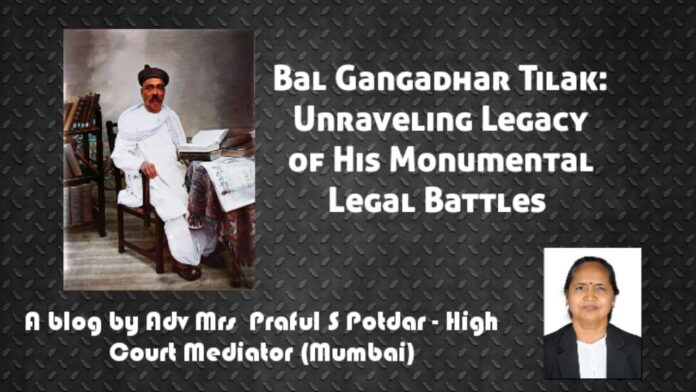As a highly esteemed Legal Services Professional and High Court Mediator hailing from Mumbai, I am deeply honored to delve into the extraordinary legal battles fought by the eminent lawyer and nationalist leader, Bal Gangadhar Tilak, which played a pivotal role in shaping India’s momentous fight for independence. Accompany me on this captivating journey through the “judgment days” that defined the course of history.
The Kesari Newspaper Case (Year: 1897) – Triumph of Freedom of Speech
In the year 1897, Bal Gangadhar Tilak found himself at the forefront of defending the freedom of the press in the Kesari newspaper case. Accused of sedition under Section 124A of the Indian Penal Code, Tilak’s impassioned defense led to a momentous judgment day when he secured an acquittal. Justice Strachey, recognizing the profound significance of free speech and expression, set an enduring precedent that resonated throughout colonial India.
The Swadeshi Steam Navigation Company Case (Year: 1904) – Igniting the Embers of Nationalism
The Swadeshi Steam Navigation Company case of 1904 saw Tilak daringly challenge the British government’s monopolistic control over shipping, which resulted in a legal battle under Section 121 of the Indian Penal Code. Despite an adverse judgment day, Justice Davar acknowledged Tilak’s vision for self-reliance and ignited the flames of the Swadeshi movement, leaving an indelible mark on India’s burgeoning nationalist aspirations.
The Sedition Case (Year: 1908) – A Defining Moment in India’s Struggle
In the Sedition case of 1908, Tilak’s fiery speeches and writings denouncing British rule led to charges of sedition under Section 124A of the Indian Penal Code. On the fateful judgment day, Justice Dinshaw Davar recognized Tilak’s ardent dedication to nationalism and the rights of Indians to fight for their freedom. Although he faced imprisonment, the case triggered a resounding public outcry and transformed the struggle for independence into an unyielding force.
The Muzzafarpur Conspiracy Case (Year: 1908-1909) – Exposing British Oppression
During the Muzzafarpur Conspiracy case of 1908-1909, Tilak faced charges of sedition and incitement of violence under Section 121 of the Indian Penal Code. With his formidable defense, Tilak laid bare the oppressive nature of British rule and fervently advocated for political reforms. On the judgment day, Justice Norman Macleod acknowledged the urgent need for such reforms, marking a significant turning point in India’s relentless pursuit of freedom.
The Tilak v/s Bombay Municipality Case (Year: 1917) – Safeguarding Cultural Heritage
In the landmark Tilak v/s Bombay Municipality case of 1917, Tilak valiantly fought against the ban on public Ganesh festival celebrations. Invoking Article 25 of the Indian Constitution, he staunchly defended the people’s right to observe the festival. On the momentous judgment day, Justice Shah acknowledged Tilak’s legal acumen and the overwhelming public support, ensuring the continuation of the Ganesh festival and preserving Maharashtra’s cherished cultural heritage.
Conclusion:
The unwavering commitment to justice and the unyielding pursuit of freedom demonstrated by Bal Gangadhar Tilak continue to inspire generations across India. Each judgment day in his historic legal battles left an indelible mark on the nation’s destiny. As a Legal Services Professional and High Court Mediator hailing from Mumbai, I am deeply humbled to share these profound insights, exemplifying the transformative power of law in a nation’s relentless struggle for liberty.
References:
- Chitnis, K. N. (2009). “Lokmanya Tilak: Father of Indian Unrest.” Read Books Ltd.
- Jalal, A. (1990). “Colonialism and Modernity.” University of Chicago Press.
- Keer, D. (2009). “Lokmanya Tilak.” Popular Prakashan.

















